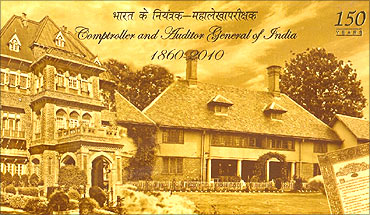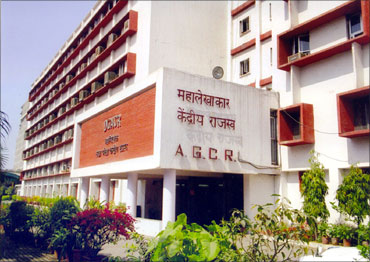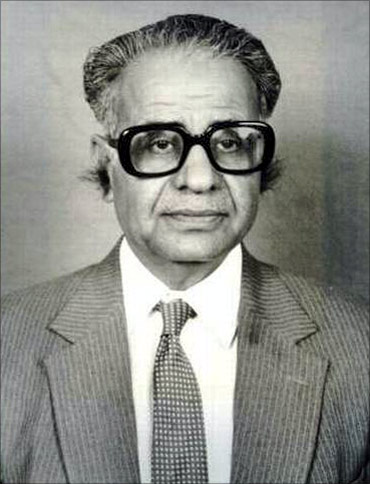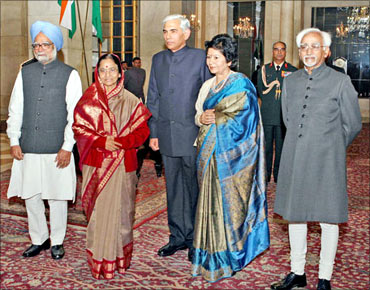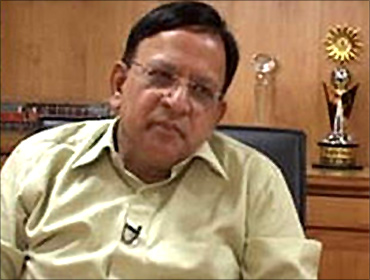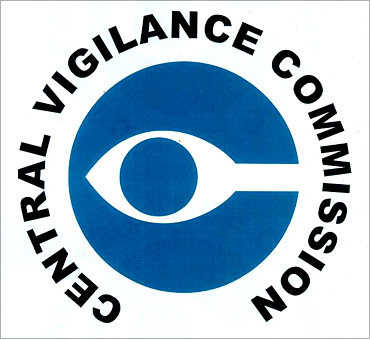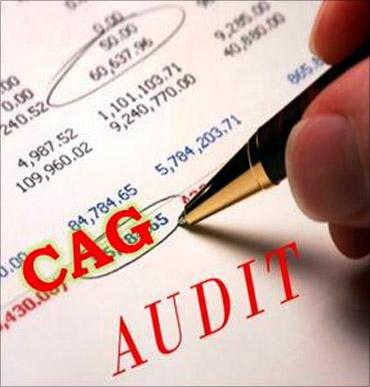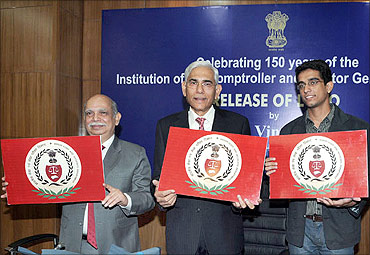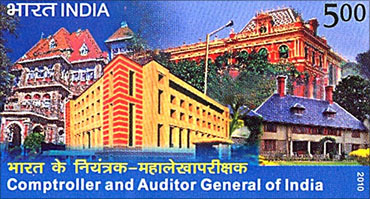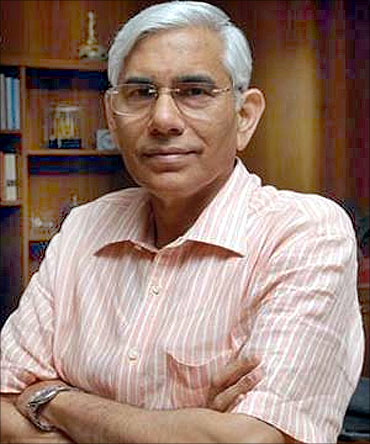 | « Back to article | Print this article |
CAG: From account checker to conscience keeper
On Deen Dayal Upadhyaya Marg in the heart of New Delhi, an imposing building reminiscent of the raj came up about a year ago.
The Comptroller and Auditor General (CAG) chose this design over the modern glass structure to house a 150-year institution that finds itself in the midst of the affairs of the new economy. The institution, created to set right the British finances after the first war Indian independence in 1857, now seems to be donning the cloak of a whistle blower. In the early years of its inception and until as late as the 1980s, no reference to a private company was ever made in any CAG report.Click NEXT to read on
CAG: From account checker to conscience keeper
Not surprisingly, CAG's recent report on the distribution of 2G licences and spectrum, while raising questions on the working of the Department of Telecommunications, explicitly named and indicted private companies like Unitech, Reliance Telecom, Loop, Swan and Videcon for not meeting the requirements of the licensing policy.
CAG reports, whether on spectrum or Commonwealth Games, have heaped a lot of embarrassment on the government and private sector companies. Those who have closely worked with the institution, however, say that CAG's job is not to look at corruption.
Click NEXT to read on
CAG: From account checker to conscience keeper
T N Chaturvedi - the seventh CAG of independent India and the man who blew the lid off the infamous Bofors deal, turning the Congress' dream run of 1984 into a defeat in 1991 - also says that CAG's brief does not include detecting corruption.
"Its basic function is to see whether or not all the resources of the different segments of the government are raised in line with the law and spent for purposes approved by Parliament. The leakages and irregularities in these two (raising and spending) lead to problems."
Click NEXT to read on
CAG: From account checker to conscience keeper
At the Centre, it confines itself to audit, with the Controller of Government Accounts doing the accounting job. The CAG office is currently headed by the 11th comptroller and auditor general, Vinod Rai. Besides, there are five deputy CAGs and four additional deputy CAGs.
Depending on the purpose, CAG can conduct compliance, financial attest, performance or some offbeat audits like social and environment. While compliance audit is done on select transactions, like purchases by the Public Works Department, and entails raising questions related to financial propriety, financial attest audits are largely supplementary in nature.
Click NEXT to read on
CAG: From account checker to conscience keeper
As opposed to private auditors, who are often accused of turning the other way when company managements rig the accounts, the very creation of CAG through a chapter in the Constitution ensures there is autonomy.
But the fact that the head of the institution is appointed by the government and usually from the Indian Administrative Service often raises doubts. A former CAG says that the appointment to high offices also depends on how close a person is to the political head.
Former chief vigilance commissioner, Pratyush Sinha, however, denies any interference from the government.
Click NEXT to read on
CAG: From account checker to conscience keeper
CAG observations could act as an input for ministries to improve their functioning.
"Things pointed out by CAG can rectify a problem. The government can also take civil and criminal action on the basis of its recommendations. CAG, in that sense, helps in administrative functioning and optimisation of resources, as approved by the legislature," says Chaturvedi. He equates CAG with the Supreme Court. Both are constitutional bodies with the government having no power to remove the judges or the CAG. They can be removed only by Parliament through impeachment.Click NEXT to read on
CAG: From account checker to conscience keeper
The changing role of CAG has also a lot to do with the government policy and the quantum of money being handled in the economy. It now also looks at public-private partnership projects, where the government does the viability gap funding for private developers.
Even in the case of the petroleum ministry approving higher cost of development of Reliance Industries' D6 block, CAG decided to audit the case, as it had a bearing on the quantum of revenue flowing to the government.
Click NEXT to read on
CAG: From account checker to conscience keeper
Since primary source of audit for CAG are the documents provided by the companies and government departments concerned, CAG has proposed amending the Duties, Powers and Conditions of Service Act to get statutory power to audit PPP projects.
The proposed amendment will also bring Panchayats in its ambit. "About 53 per cent of the government's expenditure currently remains out of audit. These amendments will enable greater scrutiny," says the CAG official.
The amendment also proposes fixing a time limit for tabling the reports, since the government often delays unfavourable reports.
Click NEXT to read on
CAG: From account checker to conscience keeper
But, as Sinha points out, vigilance and audit are both management tools and there is no adversarial relationship between them and the decision makers.
"Both insist on transparency, equity and objectivity in decision making and implementation of government policy. Both emphasise normative behaviour on the part of public servants." If decisions are taken in a fair and transparent manner, there is nothing to fear, especially since the Supreme Audit Institution has evolved from a mere inspector of government accounts to its conscience keeper.
Click NEXT to read on
CAG: From account checker to conscience keeper
Audit and inspection may sound scary, but some of the CAG reports now resemble the small-sized Noddy books.
The current CAG, Vinod Rai, brought the new concept to create public awareness about its reports, mostly forgotten after being tabled in Parliament.Reports that touch the day-to-day life of public, like that on railway cleanliness, are published in this format. Some 14 such picture books, carrying snapshots and a CD with detailed report in their jackets, have already been released.
Click NEXT to read on
CAG: From account checker to conscience keeper
Two days before that, A Raja resigned as the communications minister, as the controversy had preceded the tabling, with the media splashing the report much earlier. The Congress accused the CAG of leaking the reports.
On this, former CAG T N Chaturvedi says, the institution is not administered the oath of secrecy, though propriety demands that the reports be first tabled in Parliament.